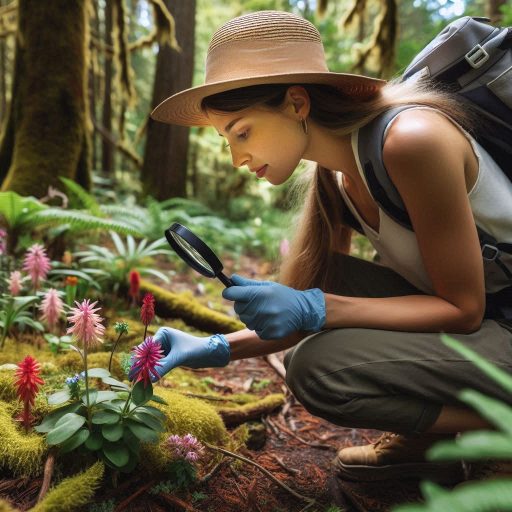Introduction
Botany is the scientific study of plants, including their physiology, structure, and ecological importance.
Botanists play crucial roles across industries by applying their expertise to solve environmental and agricultural challenges.
Why Botanists Matter
Botanists contribute to various sectors by:
- Agriculture: Developing disease-resistant crops and improving yields.
- Environmental Conservation: Restoring ecosystems and preserving endangered plant species.
- Pharmaceuticals: Identifying plants with medicinal properties for drug development.
- Forestry: Managing forests sustainably and preventing deforestation.
Their work supports biodiversity and ensures food security for growing populations.
Expanding Career Opportunities
In today’s world, the demand for botanists continues to grow.
Industries rely on their knowledge to address climate change, enhance sustainability, and promote green technologies.
Governments, research institutions, and private companies recruit botanists for various specialized roles.
This guide will explore diverse career paths for botanists, including research, education, consulting, and biotechnology.
Whether you aim to conserve nature or innovate in agriculture, a career in botany offers rewarding opportunities.
Keep reading to discover how you can make a meaningful impact as a botanist.
Education and Skills Required for Botanists
Bachelor’s Degree in Botany or Related Field
To pursue a career as a botanist, you need a solid educational foundation.
Most botanists hold a bachelor’s degree in botany or a related field.
This degree provides essential knowledge about plant biology, ecology, and physiology.
Many universities offer programs specifically focused on botany, allowing students to specialize in various aspects of plant science.
Strong Foundation in Biology, Chemistry, and Plant Science
A strong foundation in biology is crucial for understanding plant life.
You will study the complex processes of plant growth and reproduction.
This knowledge helps botanists analyze how plants interact with their environment.
Courses in ecology will also benefit you.
Understanding ecosystems and the role of plants within them is vital for any botanist.
In addition to biology, a solid grasp of chemistry is essential.
Plants produce a wide range of chemical compounds.
These compounds play roles in metabolism, growth, and defense.
Knowledge of organic chemistry can help you understand these processes.
It also aids in researching plant-based substances, such as medicines and pesticides.
Aspiring botanists should also focus on plant science courses.
Topics such as plant taxonomy, morphology, and genetics are fundamental.
Taxonomy involves classifying and naming plants, while morphology studies their structure.
Genetics explores how plants inherit traits.
Together, these subjects provide a comprehensive understanding of plant biology.
Skills in Research, Data Analysis, and Fieldwork
Hands-on experience is just as important as classroom learning.
Internships and research opportunities enhance your understanding of botany.
Many universities offer research programs where you can work alongside experienced botanists.
These experiences help you develop practical skills that are vital in the field.
Technical skills are also important for a successful career in botany.
You will often use laboratory equipment to conduct experiments.
Familiarity with tools such as microscopes and spectrophotometers is beneficial.
Additionally, you may need to analyze data using statistical software.
Proficiency in these tools will give you an edge in your career.
Communication skills are essential as well.
Botanists often collaborate with other scientists and present their findings.
You should be able to write clear reports and give presentations.
Effective communication ensures your research reaches a broader audience.
Transform Your Career Today
Unlock a personalized career strategy that drives real results. Get tailored advice and a roadmap designed just for you.
Start NowFinally, consider joining professional organizations.
Groups such as the Botanical Society of America offer resources and networking opportunities.
Membership can connect you with other botanists and enhance your career prospects.
Generally, a successful career as a botanist requires a strong educational background and a variety of skills.
Focus on your studies in biology, chemistry, and plant science.
Seek hands-on experiences and develop your technical and communication skills.
With dedication and the right qualifications, you can thrive in the field of botany.
Job Opportunities for Botanists
Botanists enjoy a wide range of job opportunities across various sectors.
Their expertise in plant science opens doors in research, conservation, and education.
Here are some prominent career paths for aspiring botanists.
Research Positions in Government Agencies, Universities, and Private Companies
Research positions represent a significant area for botanists.
Government agencies often hire botanists for environmental studies and policy development.
These roles involve conducting experiments and analyzing plant ecosystems.
Universities also seek botanists for research roles.
They focus on advancing scientific knowledge in areas like plant genetics and ecology.
Private companies, particularly in agriculture, biotechnology, and pharmaceuticals, frequently employ botanists.
These professionals work on developing new crops or plant-based products.
They also analyze plant responses to environmental changes.
Botanists can find positions in various research fields, including ecology, plant physiology, and taxonomy.
Research institutions often collaborate with universities to enhance their studies.
Grants and funding from public and private sources support many research initiatives.
This allows botanists to contribute to groundbreaking discoveries that impact society and the environment.
Conservation Roles in Botanical Gardens, National Parks, and Environmental Organizations
Conservation roles provide another fulfilling career path for botanists.
Botanical gardens play a crucial role in plant conservation.
Botanists in these settings often manage living collections of plant species.
They work on preserving endangered plants and educating the public about conservation efforts.
National parks and wildlife reserves also hire botanists to monitor plant health.
These professionals assess the impacts of climate change and invasive species.
Their work helps develop management strategies to protect natural ecosystems.
Environmental organizations frequently employ botanists to support conservation projects.
These roles often involve fieldwork, data collection, and habitat restoration.
Botanists in this sector advocate for sustainable practices that benefit both plants and people.
Their efforts contribute to the overall health of ecosystems and biodiversity.
Teaching Positions at High Schools or Colleges
Teaching positions offer botanists a chance to inspire future generations.
Many high schools and colleges seek qualified instructors with a strong background in botany.
These educators teach students about plant biology, ecology, and environmental science.
They help students develop critical thinking skills through hands-on experiments and fieldwork.
Higher education institutions often provide opportunities for botanists to engage in research while teaching.
This dual role allows them to stay current in their field and share knowledge with students.
Online courses and programs also create new teaching avenues.
Botanists can reach a wider audience through virtual education platforms.
Botanists have diverse job opportunities across research, conservation, and education.
Their skills and knowledge contribute significantly to environmental sustainability and scientific advancement.
Those interested in a career in botany should explore these options to find their niche.
The future of botany holds exciting possibilities for passionate individuals ready to make an impact.
Read: The Impact of Technology on the Chemist Profession in the US
Industry Demand for Botanists
The demand for botanists continues to grow in various industries.
As society shifts toward sustainable practices, botanists play a critical role.
They contribute to sustainable agriculture and environmental conservation efforts.
Their expertise helps optimize crop yields while minimizing environmental impacts.
Farmers increasingly rely on botanists for innovative solutions.
This focus on sustainability drives demand for skilled professionals.
Growing Focus on Sustainable Agriculture and Environmental Conservation
As society prioritizes sustainable agriculture, the role of botanists becomes increasingly important.
They help develop practices that protect natural resources.
Botanists work with farmers to enhance soil health and reduce pesticide use.
Their knowledge supports crop rotation and companion planting strategies.
These practices improve agricultural productivity while safeguarding ecosystems.
Consequently, organizations and governments seek botanists to aid in environmental conservation.
Advancements in Biotechnology and Genetic Engineering
Advancements in biotechnology and genetic engineering further amplify the demand for botanists.
They work at the forefront of these scientific developments.
Botanists develop new techniques to enhance plant traits, such as improving disease resistance.
They also focus on increasing nutritional value through genetic modifications.
As biotechnological applications expand, botanists are vital in implementing these innovations.
Their expertise in plant genetics helps shape the future of agriculture.
Increased Interest in Medicinal Plants and Natural Products
There is a significant increase in interest in medicinal plants and natural products.
Many people are turning to herbal remedies and natural supplements.
This trend creates opportunities for botanists to conduct research and develop new products.
Botanists study plant properties to discover new medicinal compounds.
Their research supports the growing market for natural health products.
Pharmaceutical companies seek botanists to support drug discovery and development.
These professionals provide crucial insights into plant-based compounds.
Their expertise helps identify potential treatments for various health conditions.
As a result, the industry increasingly values the contributions of botanists.
Conservation organizations also rely on botanists.
These organizations focus on preserving biodiversity and protecting endangered plant species.
Botanists help identify and document plant species through field studies.
Their work supports conservation efforts and informs policy decisions.
The agricultural sector benefits from botanists’ knowledge.
They help develop sustainable farming practices, including integrated pest management.
These practices enhance food security and protect natural resources.
As awareness of these methods grows, the demand for botanists in agriculture increases.
Showcase Your Business Today
Reach thousands of readers actively exploring professional services. Publish your business profile and grow your audience now.
Publish NowFurthermore, the education sector seeks botanists to teach future generations.
Universities and colleges hire botanists as professors and researchers.
These professionals shape curriculum development and guide student research projects.
They inspire students to pursue careers in botany and related fields.
Overall, the industry demand for botanists remains robust.
Their contributions are essential in addressing global challenges.
As sustainability, biotechnology, and natural health products gain importance, so does the role of botanists.
With a diverse range of career opportunities, the future looks bright for aspiring botanists.
Their expertise will continue to drive advancements in science, agriculture, and conservation.
Read: Essential Skills and Tools for Modern Chemists in America

Salary and Benefits for Botanists
Average Salary Range for Entry-Level, Mid-Career, and Senior Botanists
Botanists enjoy a diverse range of salary levels depending on their experience and specialization.
Entry-level botanists typically earn between $40,000 and $50,000 annually.
Those with a bachelor’s degree and some relevant experience can expect to start within this range.
As they gain experience, their salaries can increase significantly.
Mid-career botanists, usually with five to ten years of experience, earn an average salary of $60,000 to $80,000.
They often take on more complex research projects and responsibilities.
Their expertise in specific botanical fields can lead to higher pay and better job opportunities.
Senior botanists, those with over ten years of experience, often earn $90,000 or more.
These professionals frequently hold leadership positions and manage large projects or teams.
Benefits Such as Health Insurance, Retirement Plans, and Professional Development Opportunities
In addition to competitive salaries, botanists receive various benefits.
Health insurance is a standard offering in many botanical careers.
Employers often provide coverage for medical, dental, and vision care.
This helps ensure that botanists can focus on their work without worrying about health costs.
Retirement plans, such as 401(k) or pension plans, are also common benefits.
Many employers match contributions, helping botanists save for their future.
These plans provide financial security for botanists as they approach retirement age.
Professional development opportunities are another valuable benefit.
Employers often support their staff in attending conferences, workshops, and training programs.
This investment in continuing education keeps botanists updated on industry trends and advancements.
It enhances their skills and expands their professional network.
Non-Monetary Perks Like Flexible Schedules, Travel Opportunities, and Work-Life Balance
Botanists also enjoy non-monetary perks. Flexible schedules allow them to balance work and personal life effectively.
Many employers recognize the importance of work-life balance and support arrangements that suit individual needs.
This flexibility can include remote work options and adjustable hours.
Travel opportunities often arise in botanical careers, especially for those involved in field research.
Botanists may travel to remote locations to collect samples or conduct studies.
This travel can be both exciting and enriching, offering chances to explore new environments.
In summary, botanists enjoy a rewarding career with competitive salaries and comprehensive benefits.
The combination of monetary compensation, health insurance, retirement plans, and professional development enhances their job satisfaction.
Non-monetary perks like flexible schedules and travel opportunities contribute to a fulfilling work-life balance.
As a result, pursuing a career in botany can be both financially rewarding and personally satisfying.
Read: The Role of Chemists in US Environmental and Sustainability Efforts
Career Advancement Paths for Botanists
Specialization Options in Plant Genetics, Ecology, Ethnobotany, or Horticulture
Botanists can enhance their careers by specializing in various subfields, allowing them to focus on specific areas of interest:
- Plant Genetics: Specializing in plant genetics involves studying the heredity and variation of plants, including the genetic basis of traits and the development of new plant varieties.
This specialization is crucial for improving crop yields and resistance to diseases. - Ecology: Botanists focusing on ecology study plant interactions with their environments and other organisms.
They may work in conservation, restoration ecology, or ecosystem management, contributing to biodiversity preservation and ecosystem health. - Ethnobotany: This field explores the relationships between people and plants, including how different cultures use plants for food, medicine, and rituals.
Ethnobotanists often engage in fieldwork, studying traditional knowledge and advocating for sustainable practices. - Horticulture: Specializing in horticulture involves the cultivation and management of plants for food, ornamental purposes, or landscaping.
Horticulturists may focus on plant breeding, landscape design, or sustainable agriculture practices.
Leadership Roles in Project Management, Team Supervision, or Research Direction
As botanists gain experience, they can transition into leadership positions that involve greater responsibility:
- Project Management: Botanists can lead research projects, overseeing study design, data collection, and analysis.
They may be responsible for budget management, timeline development, and ensuring project goals are met. - Team Supervision: Experienced botanists can take on roles where they supervise teams of researchers, technicians, or students.
This role involves mentoring, training, and fostering collaboration to achieve research objectives. - Research Direction: In academic or institutional settings, botanists can lead research programs, setting strategic goals, securing funding, and guiding the direction of research initiatives.
Opportunities for Publishing Research Papers, Presenting at Conferences, and Collaborating with Other Scientists
Continuous professional development is essential for career growth in botany:
- Publishing Research Papers: Botanists are encouraged to publish their findings in scientific journals.
This not only contributes to the field but also enhances their reputation and visibility among peers. - Presenting at Conferences: Attending and presenting at conferences allows botanists to share their research, network with other professionals, and stay updated on the latest developments in their field.
- Collaborating with Other Scientists: Collaborative projects can lead to innovative research opportunities and broaden a botanist’s expertise.
Working with interdisciplinary teams can enhance their understanding of complex ecological and environmental issues.
Career advancement for botanists offers diverse paths through specialization, leadership roles, and continuous professional development.
By pursuing these opportunities, botanists can contribute significantly to the field, drive research innovations, and enhance their professional profiles.
Read: Day in the Life: An Environmental Scientist’s Typical Day
Challenges and Opportunities in the Botany Field
The emergence of new plant diseases poses challenges to agriculture and ecosystems, prompting botanists to engage in research and develop management practices.
Limited Job Openings in Specific Regions or Industries
The job market for botanists can be competitive, particularly in specific regions or industries:
- Regional Disparities: Certain geographic areas may have a high demand for botanists due to local ecosystems, conservation efforts, or agricultural needs, while others may have limited opportunities.
- Industry Variability: Employment opportunities can vary significantly across industries, such as academia, government, or private sector roles, impacting job availability.
Competition for Research Grants and Funding
Securing funding is often a significant challenge for botanists:
- Grant Competition: With many researchers vying for limited funding, botanists must develop strong proposals and demonstrate the societal relevance of their research.
- Economic Factors: Economic downturns can lead to reduced funding for research initiatives, making it essential for botanists to be adaptable and seek alternative funding sources.
Emerging Trends in Climate Change, Invasive Species, and Plant Diseases
The field of botany is evolving, presenting both challenges and opportunities:
- Climate Change: Botanists must address the impacts of climate change on plant species and ecosystems, offering opportunities for research and conservation strategies.
- Invasive Species: Understanding and managing invasive plant species requires ongoing research and innovative solutions, creating demand for expertise in this area.
Conclusion
In this guide, we explored diverse career opportunities for botanists.
We examined various fields, including research, conservation, education, and industry.
Each sector offers unique pathways for aspiring botanists.
Careers in research focus on plant biology and environmental science.
Conservation roles emphasize preserving ecosystems and endangered species.
Education provides opportunities to inspire future generations about plant science.
Industry positions include roles in pharmaceuticals, agriculture, and biotechnology.
These sectors leverage botanical knowledge for product development and sustainability initiatives.
Botany also intersects with fields like landscape architecture and horticulture.
These connections enhance our understanding of plants in urban and rural settings.
We discussed the importance of education and training.
A degree in botany, plant science, or a related field is essential.
Advanced degrees open doors to research and specialized positions. Internships and volunteer opportunities provide hands-on experience and enhance your resume.
Networking is crucial for success in this competitive field.
Aspiring botanists should connect with professionals through organizations like the Botanical Society of America.
These networks offer mentorship, job listings, and educational resources.
Attending conferences and workshops helps you meet like-minded individuals and learn about industry trends.
[E-Books for Sale]
The Big Book of 500 High-Paying Jobs in America: Unlock Your Earning Potential
$19.99 • 500 High-Paying Jobs • 330 pages
Explore 500 high-paying jobs in America and learn how to boost your career, earn more, and achieve success!
See All 500 High-Paying Jobs of this E-Book
1001 Professions Without a Degree: High-Paying American Jobs You Can Start Now
$19.99 • 1001 Professions Without a Degree • 174 pages
Discover 1001 high-paying jobs without a degree! Unlock career tips, skills, and success strategies for just $19.99!




